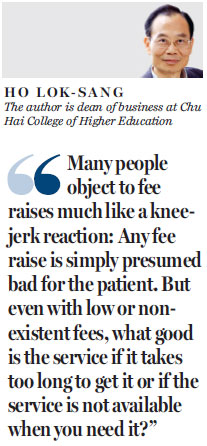The case for raising public healthcare fees
Updated: 2016-12-20 07:05
By Ho Lok-sang(HK Edition)
|
|||||||||
Ho Lok-sang says the Hospital Authority is right to raise the fees which it charges on health services, but adds that a cap on a person's annual expenses is also needed
The Hospital Authority (HA) recently proposed raising the fees it charges on health services, which have not changed for many years. The proposed raises are appropriate, but this should go hand in hand with introducing an annual cap on eligible healthcare expenses for each patient. This annual cap can be regarded as the "annual deductible" that people have to pay before the benefits of the "public insurance plan" kicks in.
I have argued that the HA is like a giant "health maintenance organization" that provides insurance to every Hong Kong citizen and offers medical services at the same time. Hong Kong people do not pay an explicit insurance premium, but actually are paying such a premium indirectly through the tax system. The poor of course do not pay much tax, but even in Taiwan, where everybody is covered by the public insurance plan, the poor can pay reduced premiums or may even be exempt from the payment. According to the official website, "the percentage of the premium paid by the insured for each category varies from 0 percent for low income citizens to 100 percent for the self-employed."
I have been advocating fee raises along with putting a cap on patients' eligible healthcare since I first made the proposal in my book Health Care Financing and Delivery: A Model for Reform, published in 1997. This could have allowed the HA to have the necessary resources to improve its services greatly. Then Hong Kong people could have timelier and better services. Unfortunately, this simple proposal has been ignored by our legislators and by our government for all these years.

Actually, this simple arrangement combines user fees and tax financing. Moreover, it represents an application of the insurance principle, as well as the concept of "annual deductible". Patients who want protection against the expenses that they may have to pay can buy private insurance, which will involve very reasonable insurance premiums because the maximum exposure for the insurance companies is only the annual deductible.
Many people object to fee raises much like a knee-jerk reaction: Any fee raise is simply presumed bad for the patient. But even with low or non-existent fees, what good is the service if it takes too long to get it or if the service is not available when you need it? Today, many patients have to wait a long time before they can get a specialist clinic appointment or for an MRI.
I, too, would object to fee raises if there is not a cap on annual expenses. With an annual cap in place, what is there to worry about? Patients will pay only when they can afford it and will not have to pay any more once the total expenses become excessive. This is why I call this system "Excessive Burden Insurance".
With the technology available today, in particular with the electronic records that each patient will have, tracking the cumulative eligible expenses each year is no longer difficult. Once the cumulative expenses reach the cap, the patient will be advised that he will not have to pay any more for the rest of the year.
For the poor we may also reduce fees as well as lower the cap. If we do not want to put extra burden on those getting Comprehensive Social Security Assistance, we can give them an extra annual allowance that will cover the maximum healthcare fees that they have to pay.
The present fee structure of our public healthcare system really does not make much sense. People, of course, will not complain when they are asked to pay just a nominal fee for costly services. But if they can afford it, why charge them so little, especially when the healthcare system is getting more and more costly and facing increasing demands by the day? I also will not complain if we can charge patients just a nominal fee and are still able to provide reliable, timely services, and if this can be sustained. Unfortunately, when patients badly need services they may be told that they must wait; and when patients cannot afford to pay for some items which are designated to be chargeable, they sometimes have to go without these items.
As far as I can see, under our political system most if not all legislators will tend to condemn fee increases. Since they need votes in order to be re-elected, they typically will not agree to any fee increases. This is most unfortunate.
Actually, the "Excessive Burden Insurance" concept has been applied with much success in Sweden, Australia and in Taiwan, for example. It takes considerable analytical skill to see what is good for Hong Kong, and it takes political courage to stand up for what works - even when popular opinion goes against it. Let us hope for the best.
(HK Edition 12/20/2016 page1)